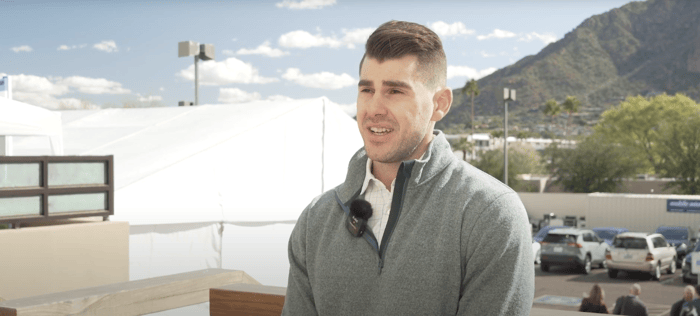7 min read
Tackling ESG issues in a global pharmaceutical company
7 min read
At GreenBiz23 Datamaran spoke with Stuart Block, Director of ESG Reporting and Analytics, at Cardinal Health, a leading distributor of pharmaceuticals and a global manufacturer of medical and laboratory products.
See the full video here, or focus on key points of interest for you in the links below.
Why do you need Datamaran?
“In today's marketplace, there's just so much information that needs to be consumed as it relates to ESG. Every day, there's either a new regulation or an article that comes out that definitely needs to be consumed. We need to be knowledgeable, not only to prepare Cardinal Health’s ESG data for external consumption, but to ensure it's in line with what the market expects, and it's in line with current trends and policies."
“Datamaran really provides us the ability to consume everything we need in a very timely and efficient manner. This ensures we are disclosing up-to-date and in line with where the world is on that given day."
What did you do before Datamaran?
“Prior to using Datamaran, it was quite manual. I ran several different news alerts telling me this legislation was passed or this policy was passed, or this white paper was released. And sometimes there were items that slipped through the cracks. Now we have a tool that allows us to stay on top of that activity quite efficiently.”
Do you trust Datamaran data?
“The thing that I love about Datamaran particularly, is when I do research or when I do some benchmarking, you're actually able to see peers or other industry members' disclosures. So Datamaran makes it really easy to trust the data because the actual data is embedded within the tool, which is one of my favorite parts of it.”

Have you seen interest in ESG increasing within your organization?
“Yes! Datamaran has actually allowed us to communicate ESG effectively to other functions within Cardinal Health."
“We've established a cross-functional working group within our organization to embed ESG in the different functions at Cardinal Health. We quite often leverage the storyboard functionality of Datamaran to help communicate to those individuals, what our peers or what other members in the business community are doing on specific ESG topics to help us inform meaningful discussions, plan strategically for ESG and take action.”
How does Datamaran influence action?
“It influences action because it tells people that if we don't keep up with the trends of ESG, if we don't do what our peers are doing, or if we don't think about what our peers are thinking about, or take action to where our peers are taking action, we could be behind."
“When it comes to some of our ESG priorities where we know we want to keep pace, we have to define what it means to keep pace. Datamaran informs us on what's happening so that we can make that definition and then we can set our own strategic path forward to take action.
Has your team built credibility by taking ESG in-house?
“Within our organization, it's been really fun to see the culture shift around ESG and build trust and credibility."
“At Cardinal, we've really gone through an entire ESG transformation journey over the past six months where we have made it a point to integrate within the business to become, what I like to call, a two-way business partner - we help them because they help us."
“And so providing meaningful insights data, preparing and disclosing meaningful stories that align with standards frameworks and other requirements, has allowed us to establish that credibility within our organization and with our external stakeholders.”
What do external stakeholders and investors want to see from your team?
“The external community is really interested in making sure we’re up to date on the current standards and frameworks. Do we know generally where we should be with our ESG disclosures in our program? What kind of goals and targets are we setting that will allow us to track the actions that we're taking across our ESG priorities?"

“Over time, what we've been able to do is, through consuming data on what regulations are in place, what our peers are doing, and learn what our stakeholders want to hear from us. We've leveraged that to build our ESG story, and reporting to make sure that we are communicating that information to them effectively."
What do you like best about Datamaran?
“The beauty of Datamaran is it allows us to really distill all of that information and cut through the noise to understand what is the priority to us, what is meaningful to us, and then build our communication and ESG disclosure strategy around that."
“So I think Datamaran has really helped us efficiently make those statements and communicate externally. And I think we'll only continue to use the tool more as we progress on our journey."
Has Datamaran helped you focus on priorities?
“Datamaran allows us to keep pace with our peers by understanding what are they disclosing? How are they disclosing it? And what quality of disclosure they are putting out in the marketplace? That allows us to make our decision on how we want to present information a lot clearer and more efficiently make that decision as well because we've been able to quickly consume what all these other companies are putting out in the public sphere.”
What are the risks of not being attuned to external stakeholder expectations?
“The biggest risk is becoming a laggard. The biggest risk is not keeping pace with what the external community expects of a company. The last thing that a public or private company wants to see is their biggest rival or their biggest peer, keeping pace with expectations exceeding and your company falling behind."
“There is a lot of risks with not keeping pace, there's a lot of risk with not understanding the entire landscape of what needs to be tracked, disclosed, what goals need to be set. So that's where a tool really helps stay in tune with all of the activities so that you can develop a strategy that is very specific to your priorities within your company."
.jpeg?width=700&height=467&name=Tackling%20ESG%20issues%20in%20a%20global%20pharmaceutical%20company%20(1).jpeg)
“When you're a laggard, you're more focused on putting out fires than getting ahead and being strategic about how you're reducing your impact. One of the things we've talked about at this conference is when you are a laggard, you think of this more as a risk mitigation standpoint, a compliance exercise, a check-the-box exercise, because you're constantly playing catch up to try to get to that point where you then can be strategic."
“If you're not a laggard, and you are keeping up to date, then you can focus your attention on being a leader where you want to be a leader; investing your resources in innovation, where it makes sense for your organization. That's the biggest difference.”
Are there benefits of being proactive and strategic with ESG?
“I think it allows us to actually be a little bit more creative in where we want to focus our attention going forward. So again, we're not focused on checking the box compliance, or risk mitigation, we know where our key risks are, and we know what our key priorities are. We really get to invest all of our time and effort in thinking strategically and engaging with stakeholders throughout the business on how can we truly embed ESG within our organization.”
Is ESG creating value?
“I think it's getting people excited about ESG. When we're able to spend time with teams outside of ESG, and really communicate the value and excite them about the opportunity, I've really seen some interesting, creative thinking, and innovation come out of our teams where they wouldn't typically spend time thinking about these things day to day."
“Our R&D team is thinking about innovative ways of eliminating certain types of materials or thinking about new products that they could roll out and, had they not had the ability to spend time with us and talk about that, I don't know if that would be on their agenda.”
Stay ahead of the ESG risks curve with Datamaran, the world's only data-driven platform to identify and monitor material ESG risks.

